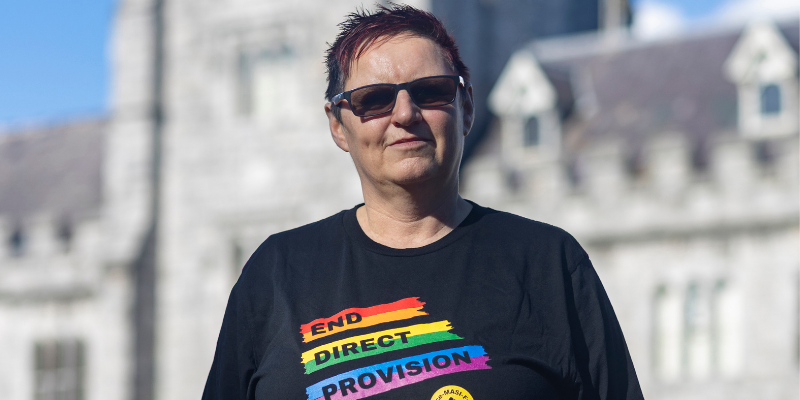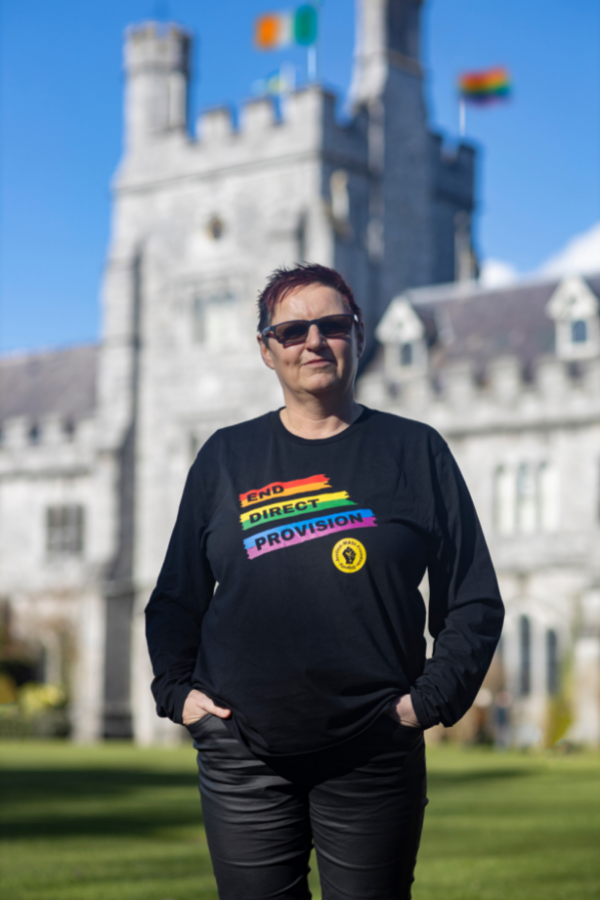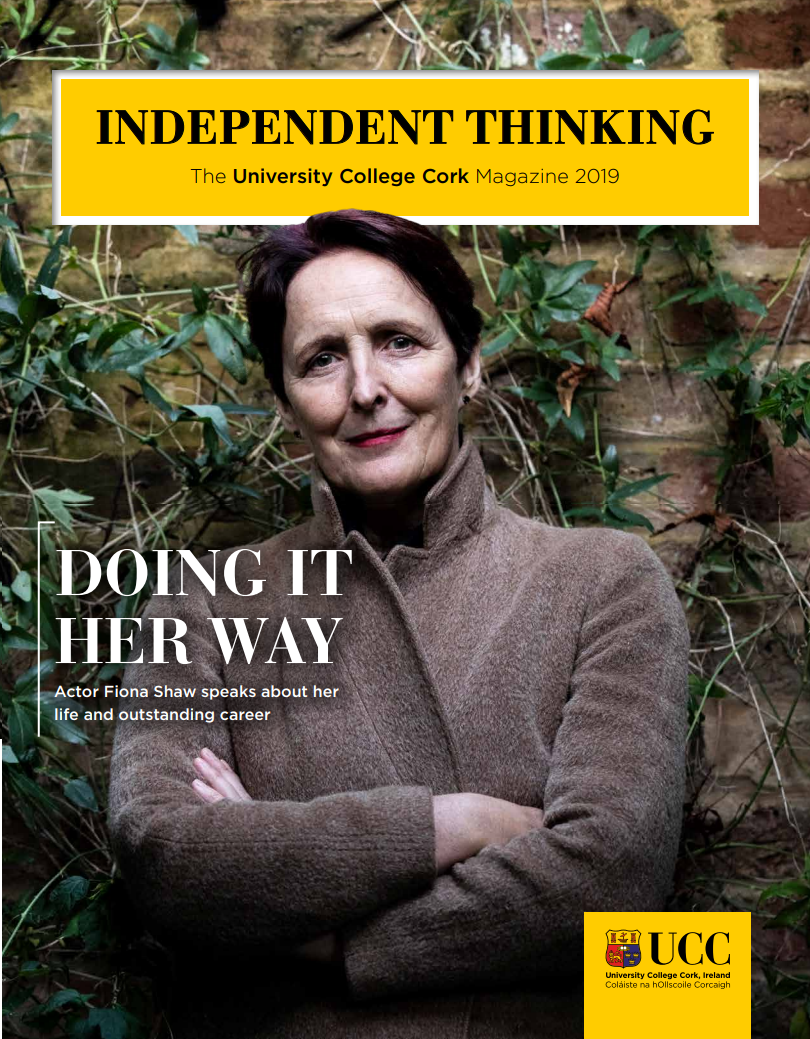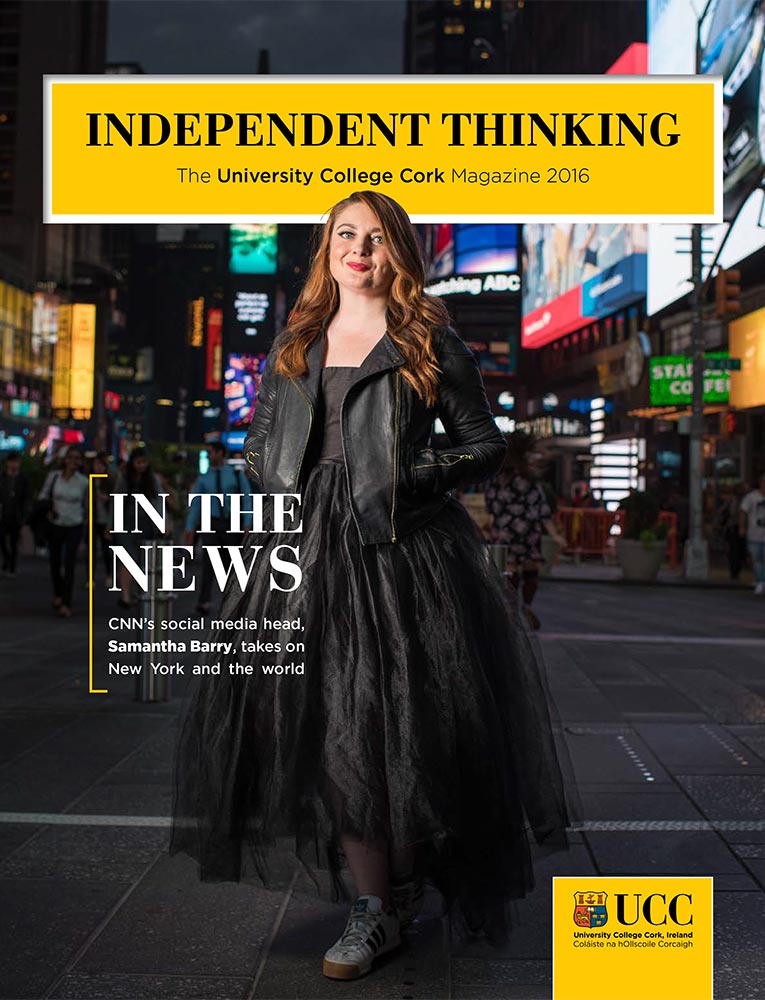Coming out of the ... Basement?
Orla Egan discusses the development of the Cork LGBTQ Archive, Ireland’s first county-specific archive project dedicated to Queer memory. In conversation with Alana Daly Mulligan.

Orla Egan is a product and proud producer of Cork’s legacy in queerness. Pasted on the walls behind her are pieces of the Cork LGBT Archive: clippings of Munster GCN – a supplement of Gay Community News, the front cover of Quare Times, some pictures of the now legendary Loafers bar. Mittens, Orla’s cat, parades across the screen of our call, demanding to be considered an icon in her own right.
With the utmost efficiency, Orla launches into the history of her history with the archive. For her, in many ways the root of the Cork LGBTQ question could be traced back to the first Lesbian Lives Conference in UCD, in 1993: “I was so excited about this space being created, an acknowledgement of lesbian activism and culture … someone was going to do a paper on lesbian activism and history in Ireland and, as it went on, the levels of disappointment and anger grew.” The reason, Orla explained, was the Dublin-centricity of Irish Queer studies and how the historiography at that time failed to acknowledge the hard work done by activists in other counties: “When I started doing this, there was very little that had been written about our history, it was predominantly Dublin-based, predominantly gay-men focused. It was more personal accounts than a complex, nuanced, inclusive history. I knew we could do better than that.”
Orla had been actively involved in the Cork lesbian community since the 1980s and wanted to demonstrate the incredibly rich and vibrant culture that was on offer but just not being talked about. Thus, shining a spotlight on Cork City’s Queer history became her mission, with the first step being to trawl through legendary Cork gay and social change activist – and one of the founders of Cork’s Quay Co-op – Arthur Leahy’s archive of materials from the 1970s onwards: “I started looking at the material in Arthur’s archive in the late ’90s, early 2000s … [Arthur] had no idea what would happen with this material, but he knew it was important to gather it, so he started keeping extra copies of things and sticking them in boxes in his basement.”
Moving the material from Arthur's house and finding it a “forever-home” is a significant story in itself. Orla recounts rescuing the archive from the damp basement and then taking on the job of cataloguing it: “It was a steep learning curve; I was basically doing archival work without being a trained archivist. I had to do an awful lot of learning along the way!”
Initially undertaking a BA in European Studies at UCC in 1983, and an MA in Women’s Studies in 1991/2, Orla returned to education to complete an MA in Digital Arts & Humanities in 2013. “I realised that how we do history has changed, and there were a lot of skills I didn’t have, so I needed to upskill,” she says.

The historian recounts the reluctance and the frustration that came with learning the new skill but cites her tutors as essential to guiding her through her grapple with digital history. While the process hasn’t been perfect, Orla argues that she persevered because the work being done is a stepping-stone from what was previously in place. She enlisted the help of Dr Elizabeth Steiner-Scott, formerly of the School of History in UCC, who helped to contextualise the materials, but it soon became clear that finding a secure space to work on the archive was an urgent priority.
“I always had this fantasy that I was going to find a Queer Chuck Feeney figure who wanted to fund the LGBT Archive, and that we would have our own space and money for staff … but they have yet to appear,” Orla jokes with a wink, segueing to mention it was at this point she had written her book, Queer Republic of Cork. The publication of the book, supported by a Cork City Council Heritage Publication Grant, started the ball rolling when it came to conversations with the Cork Public Museum. There were two core conditions of this partnership: firstly, that members of the public would be facilitated with accessing the archive after cataloguing was complete, and, secondly, that there would be a commitment to a permanent Cork LGBT exhibition in the museum.
However, the success of the archive can be credited to Orla’s charisma, approachability and ability to tell a great story with no assumptions of the listener. “I see myself outside Queer academia,” Orla says, inhabiting the skin of a public historian, the seanchaí of Cork’s LGBTQ memory. “The archive isn’t just feeding my own work and publications; it’s feeding into wider scholarship in the area. It means that Cork Queer history is now really difficult to ignore.”
"I think [the archive is] changing people’s perceptions of what it was like to be LGBT in Cork, especially in the ’70s, ’80s and ’90s."
Another priority of Orla’s is her focus on the long history of hope that’s existed within community spaces in Cork: “I think [the archive is] changing people’s perceptions of what it was like to be LGBT in Cork, especially in the ’70s, ’80s and ’90s. Often, when we look back at those decades, it’s very easy to put a negative slant on it: you had criminalisation, discrimination, ignorance, prejudice, violence, emigration, and suicide. But I’ve always been more interested in the Cork LGBT community as agents of change, how people were, and are, so brave and so proud. People demanded equality and respect, and literally changed the world, not just for the LGBT community but for broader social change movements too.”
We’re wrapping up with a rapid-fire round of questions: I ask what’s the most surprising thing Orla found in the archive – there are two very different answers. “The most surprising was when I found a box of chocolate willies that had been on sale in the Quay Co-op!” she cackles. It is admittedly quite challenging to maintain one’s composure after hearing about such an unexpected find. But Orla credits the more unusual item to being a roll of wallpaper. “UCC’s LGBT Society was finally given recognition in 1989, and the night it got recognition there was a party in someone’s house. Arthur Leahy was decorating somewhere and had a roll of wallpaper in the boot of his car which he brought into this party, wrote ‘UCC Gay Soc’ down the middle of it, and people at the party signed it with comments about what it meant to them to have the society recognised.”
Perhaps this artefact is a testament to the determination of UCC students and alumni like Orla, who fight for change within the walls of the institution and beyond to carve out a little bit of history just for other people to know that they existed. For the joyful visibility that the next generation deserves.
Next on the agenda for Orla is a slew of creative endeavours including an exciting project with artist Megan Luddy O’Leary, screening her new film I’m Here, I’m Home, I’m Happy, further expansion of the Cork LGBT Archive, and continued pursuit of a Queer Chuck Feeney character.
For more information about Orla and her work, visit her website.
Photography: Max Bell



